‘Voluptuous Pleasures of Cycling’ Explained Inside Federal Parliament
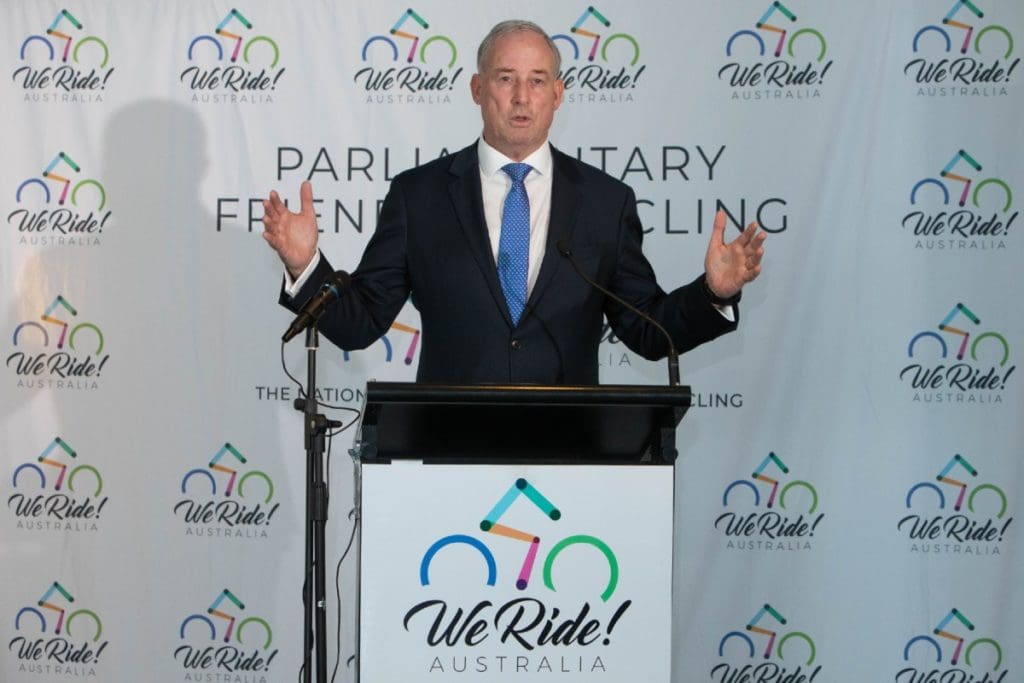
It’s hard to get a laugh at a 7:30 am breakfast function, but federal MP Andrew Leigh, Shadow Assistant Minister for Treasury, achieved this at the most recent Parliamentary Friends of Cycling breakfast, hosted by Stephen Hodge on behalf of We Ride Australia and held inside the federal parliament in Canberra on Tuesday 15th June.
Andrew Leigh told the assembled audience, “One of the quotes that I love most about cycling is line by Jean Bobet a French writer (and racer, being the younger brother of the more famous Louison Bobet). Let me read it to you.
“‘The voluptuous pleasure that cycling can give you is delicate, intimate and ephemeral.
“It arrives, takes hold of you, sweeps you up, then leaves you again.
“It is for you alone.
“It is a combination of speed and ease, force and grace.
“It is pure happiness.’
“And that for me sums up why we are all here. Yes, it’s about the economy. Yes it’s about the environment. But fundamentally, it’s about living a good life.”
Previously Mr Leigh had commenced his speech by saying, “I’d like to thank my parliamentary colleagues, my co-chairs and of course Stephen Hodge who is the air in the tyres of Parliamentary Friends of Cycling.
“As a keen cyclist and proud dad, cycling during covid was one of the ways in which we stayed sane. But it’s also the transformation that I think might prove lasting for Australians.
Cycling is an efficient way of getting around, it’s good for the environment, but fundamentally, it’s just really fun! All of you know that.”
Mr Leigh finished by introducing Andrew Giles MP, whose portfolio includes Shadow Minister For Cities, saying, “Andrew is a huge policy contributor, thinking really hard about how our future cities ought to be. He’s somebody who isn’t just caught in the moment, in the day to day, but who thinks long term, reads deeply and is engaged with that great conversation about how to make our cities work as well as possible.”
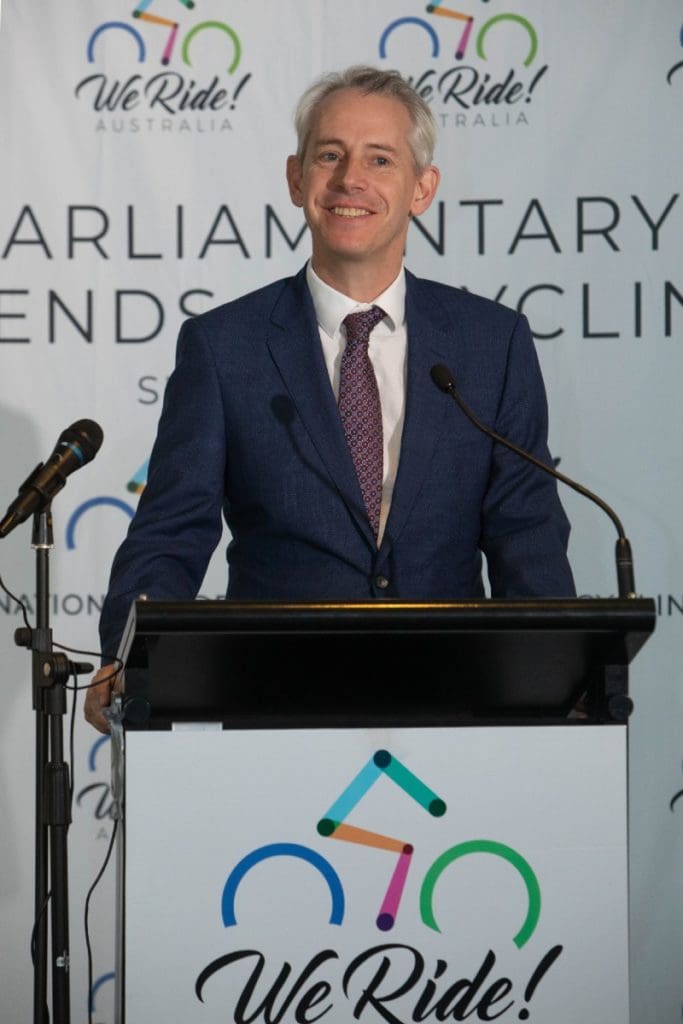
“I see them being used every day and it’s so exciting. If we build it, they will come.”
Andrew Giles MP
Andrew Giles said, “As a Melbournian, covid presented some challenges, as well as the opportunities that we’re going to talk about, but none were greater for me than meeting the expectations of a 10 year old’s bike wishes, as against the supply that was on offer!
“I think we can see an extraordinary demand for cycling across the community that perhaps was latent, but is no longer dormant through the experience of the past year.
“I want to touch upon some thoughts on the national government imperative and responsibilities in this area, to drive a further transformation around cycling, active transit, in terms of how we think about how our cities are and how we would like them to be.
“We think it’s fundamentally important that our national government brings together all stakeholders to develop a national urban policy again. And that national urban policy should be driven by three pillars: greater productivity, greater sustainability and greater liveability.
“There’s a role for cycling and cycling infrastructure in all of those pillars. And there’s a role for the cycling community and particularly We Ride (Australia) in informing how we reach those aspirations. That’s how we should form a national urban policy. That’s how we should boost cycling in Australia.
“I don’t think our policy document for active transit will be headed ‘Voluptuous Pleasure’, but I’ll speak to the National Secretary about it, we’ll put it through the focus groups and we’ll see how it goes!
“The last point I want to make is about the opportunities. This is something that I’m really excited about and it’s something I see every day… the pop up bike lanes on Heidelberg Road (a major arterial in Melbourne that we previously wrote about here).
“I see them being used every day and it’s so exciting. If we build it, they will come.
“We see in our cities a real opportunity. On the one hand to re-imagine the central city districts. To see what’s happening around pop-up cycle lanes in Sydney, in Melbourne and right around the country, it is driving the transformation.
“The other aspect of this is of course the opportunities at the other end of this (pandemic). What distributed forms of work also need cycling as a form of commuting? This is also an opportunity that can be realised and will be realised as we think about the infrastructure imperative, we think about the role of national government in setting the stage.
“That’s a conversation I’m really keen to be part of. I know it’s a conversation that Hodgey’s (Stephen Hodge in his We Ride Australia role) got some ideas about.”
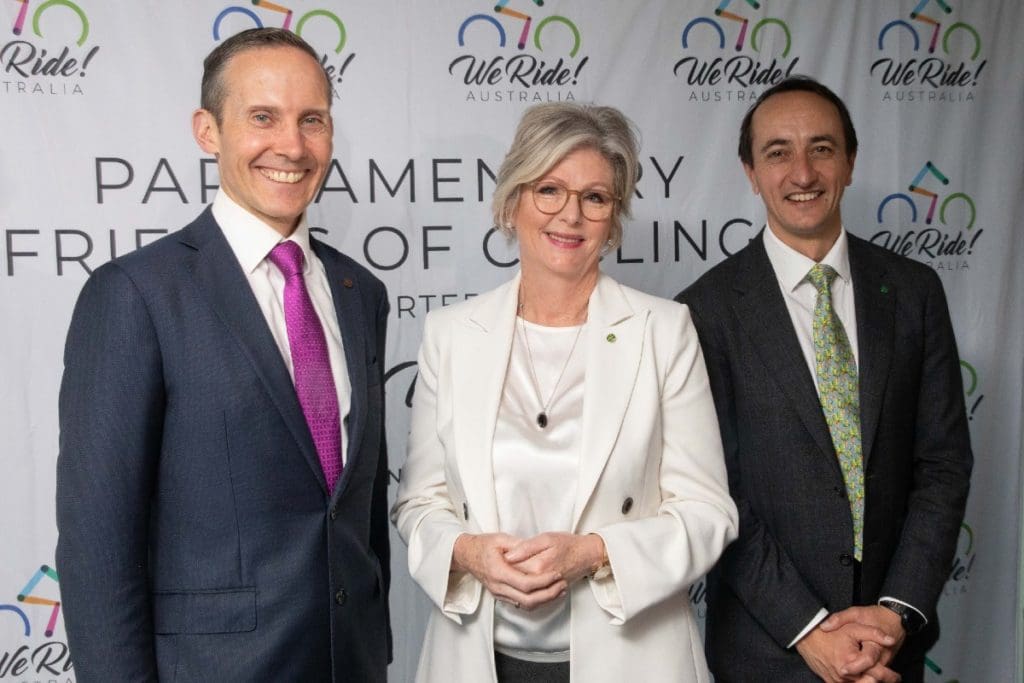
Independent MP for Indi in northern Victoria, Helen Haines, also echoed the unexpected theme that Andrew Leigh had introduced.
“I think cycling’s a lot of fun too. When I think about the guilty pleasures in life, maybe cycling is a guilty pleasure for many people, but it shouldn’t be,” she opined.
“The decision to go out for a bike ride should be an easy one. That’s why infrastructure is so important to make that an choice very simple for us.
“I also think about what happens when you cycle in a group of friends or a group of new people. You have conversations and those conversations generate great ideas. So I want to put a plug out there for the stimulation of great thought on a bike.”
Ensuring that both major parties had a share of the platform, Minister for Sport, Senator Richard Colbeck was the first to speak.
“This sport really has, in an interesting way, been a beneficiary of covid,” he said. “The challenge now for us is to maintain that level of activity and continue to provide the resources and the assets to people who are looking to continue this sport in a safe way. Perhaps I should say it’s also not so much just a sport but an activity that’s important our community.
“When you look at the broader goals that we have with respect to general activity, but also the general health and wellbeing of our community, we know that activity is a strong indicator. So to maintain that capacity to participate and be active is a very important one.”
“Cycling is a particularly challenging discussion when it comes to local communities.”
Mark Ames
After the politicians had their say, we heard from two experienced experts who have been instrumental behind the scenes in seeing cycling and other forms of active transport grow.
Mark Ames is General Manager of Connect Macquarie Park, a business led not-for-profit. Mark previously worked at the City of Sydney where he helped deliver their 2018-2030 cycling strategy and action plan.
Prior to that in the UK he was instrumental in bringing about the former Mayor of London’s 10 year, billion pound cycleway plan.
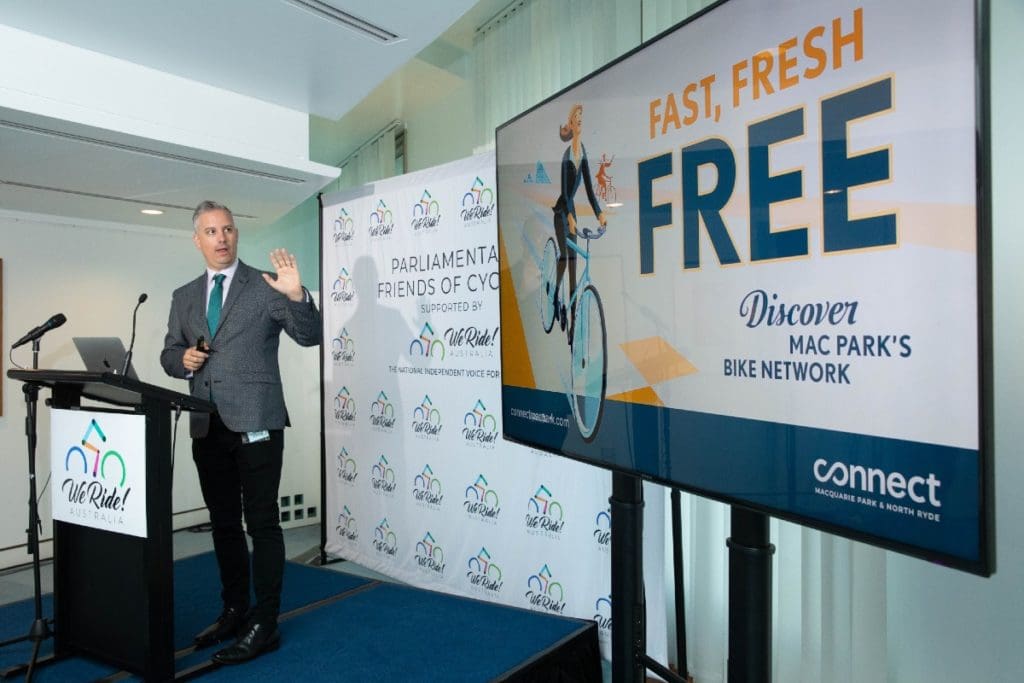
Mark gave an enlightening, brief presentation including data and images about the transformation occurring in the precinct where he’s currently employed.
“Macquarie Park is about 12 kilometres north of the Sydney City centre and is described as the ‘Stanford of the South’,” Mark explained. “That’s the way that district was built. It’s a business district which was intentionally planned around Macquarie University.
“It has the most IP (intellectual property) registrations of any Australian postcode.
More than 25 Fortune 500 companies are based in this district, and it’s growing at an incredible pace.
“There’s 72,000 employees, 40,000 students and a growing number of local residents. It’s connected by three stations on Australia’s first fully automated Metro system. However, it is also geographically constrained. It has a residential district on one side and a very large and beautiful National Park on the other side, which means it does have some significant challenges when it comes to managing congestion.
“Connect, which I lead, is Australia’s first transport management association. Back in 2013 a number of the significant employers and the government recognised that congestion would actually grow in this area to become a handbrake and an impediment to productivity.
“They realised that by working together, they could create a series of programs that would help reduce business costs, boost productivity, attract and retain the best staff and to allow Macquarie Park to grow without growing congestion.
“We do that by advocating for local improvements in the area like better bus services and upgraded cycleways and by highlighting all of the transport options to the park users.
“We use travel demand techniques like flexible working, staggered starting times, remote work to reduce congestion.
“We are having an impact. In 2014, 67% of our members’ employees used to drive to work alone. Today that is just 37% which is a really significant shift.”
Mark also represents his corporate members in discussions about transport issues with state and local government departments and elected officials.
“Cycling is a particularly challenging discussion when it comes to local communities,” he continued. “Cycling projects, pop-up cycleways, bike lanes seem to attract an especially vociferous and sometimes negative response.
“I want to reassure you that that noise is par for the course. My experience working with cities around the world is that this always happens. A response (like this) from the community is part of the process, it shouldn’t be the outcome.
“If you talk to really large employers, to businesses, who may not be turning up at the ballot box, but they’re certainly invested in this issue, you would find that you’d were pushing an open door.
“As significant stakeholders in our community, they would be say absolutely that getting their employees safely to work in a sustainable way is a key business issue for them.
If you were to ask them, ‘Would you like a cycle network to come to your workplace?’ the answer would absolutely be, ‘Yes!’”
“We’re now getting close to 20,000 trips per week just on those six pop up cycleways.”
Sara Stace – Director of Cities WSP
After that positive note, the final speaker for the morning was Sara Stace who has worked for more than 20 years in Federal, State and Local Government and the private sector. This included six years at Infrastructure Australia in their Major Cities Unit. Most recently she worked for Transport for New South Wales leading their Walking and Cycling Strategy Team. She’s just returned to the private sector as Director of Cities for global infrastructure consultancy WSP.
“When covid hit we saw around the world when cities started to go into lockdown and in various parts of Australia, that people suddenly got their bikes out of the shed, they started walking, they weren’t driving,” Sara recalled.
“There was a real shift. Cities all around the world were rapidly responding to this. Sydney in particular was one of those. We rolled out all these parklets across NSW. We managed to get that product through in six weeks from idea to actually granting funding to councils across NSW.
“We very rapidly tested and then scaled up how we could respond with better walking and cycling infrastructure. The response has been phenomenal.
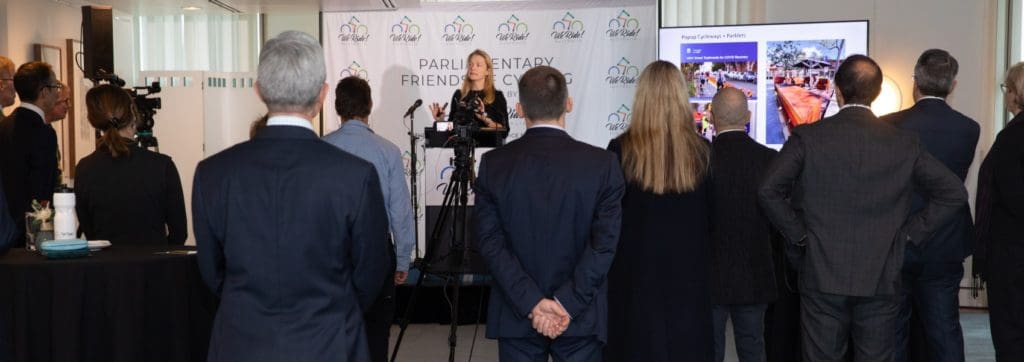
“One of the other big changes for us has been that we can prove that things that might take eight or nine years to get through, from design and community consultation, construction etcetera, we could get that down to four or five months.
“I think that’s one of the amazing things about investing in walking and cycling infrastructure. It can actually be delivered incredibly rapidly.
“We’ve put in pop up cycleways. Not only cycleways themselves, we’ve got a 40 kilometre speed limit (for motorists on the adjacent road lanes) for each of those. We’ve put in 30 kilometre per hour trial areas in Liverpool and Manly. We also put in pop up cycleways in regional NSW.
“We’ve been evaluating these very heavily. Having gone through the process of putting in pop-up cycleways this is an opportunity to not only rapidly prototype that, but we needed to test it and work with the community to talk about whether or not we needed to keep them in.
Because one part of rapidly putting them in meant that we couldn’t do the consultation required. We had to do that afterwards.
“So we measured all sorts of different aspects. Are we getting a broader diversity of riders using those? Most definitely yes. We’re getting a lot more kids and women. Pedestrians felt safer as well.
“There’s a very significant, sustained growth. We’re now getting close to 20,000 trips per week just on those six pop up cycleways (in inner Sydney). We estimate that there will be around 800,000 trips made in the first year. That’s over 3½ million kilometres cycled. We think the return on investment is under 1½ years payback in terms of economic benefits. The majority of those a health benefits but also others like environmental and congestion.
Pitt St (one of Sydney CBD’s main streets) in particular has had a 500% growth, and that’s not even fully connected yet.
“When we were asked, ‘We’re looking for opportunities for federal stimulus funding. What projects can be built in the next one to two years that are going to create jobs, stimulate the economy and be used as infrastructure. Cycleways tick all of those boxes.
“With just the pop ups alone, we created $20 million investment. We created 85 jobs. That’s around 4½ jobs per million. That’s direct jobs created, which is significantly more than any other transport project (per dollar). They’re quite labour intensive to get them done, but they don’t use a lot of capital works so the job creation per dollar is very high.”
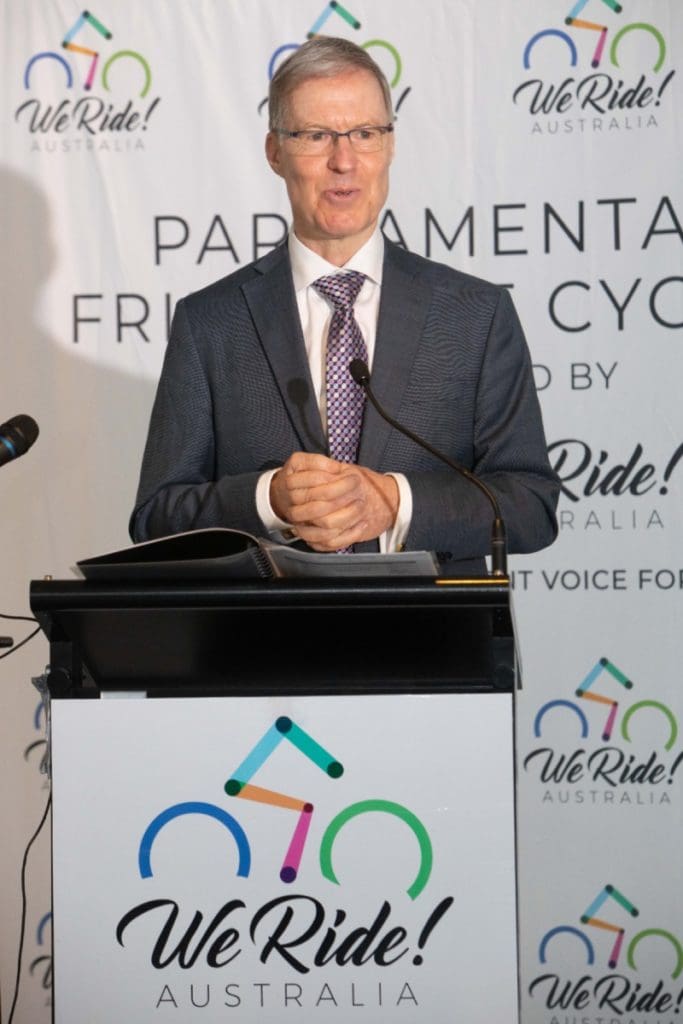
The industry funded advocacy group, We Ride Australia, is hoping to run two more Parliamentary Friends of Cycling functions before the end of the year, possibly in August and October.
Watch the full 35 minute video from the June breakfast below:
